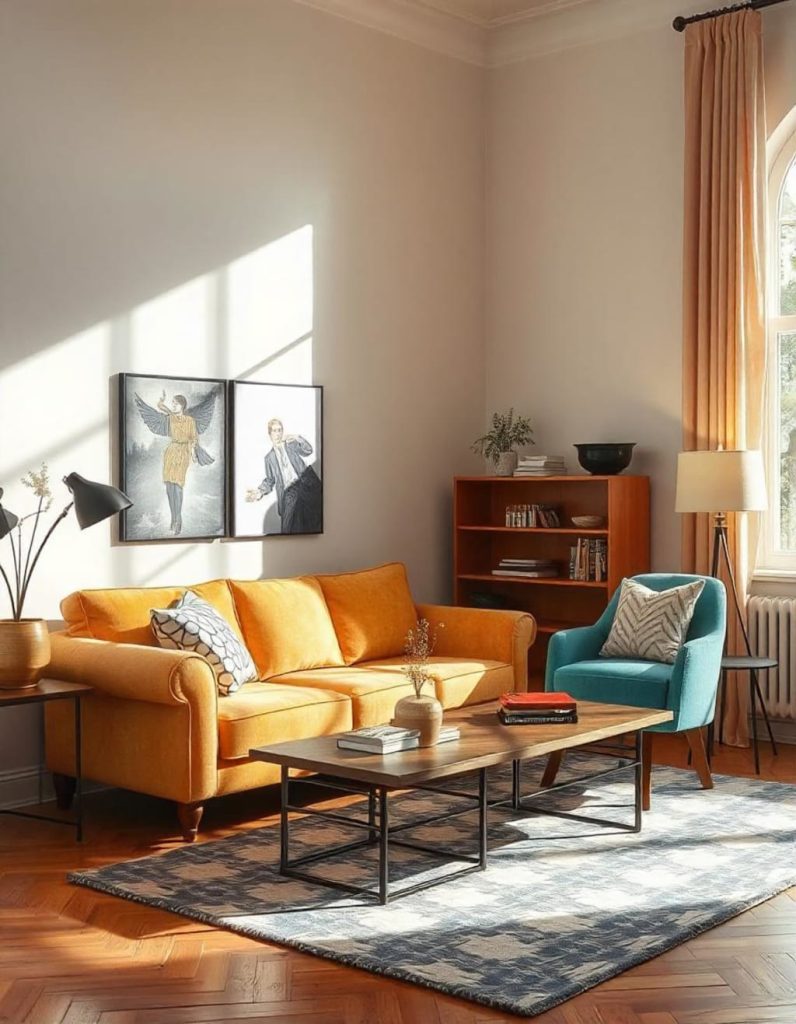The Influence of Clutter Reduction on Interpersonal Relationships: Creating Inviting Spaces for Meaningful Connections

The Importance of Harmonious Living Spaces
When we contemplate the design and organization of our homes, it becomes clear that the physical environment significantly influences our emotional well-being and interpersonal relationships. In bustling urban centers across Nigeria, where life’s pace can be overwhelming, the presence of clutter and disorganization often plagues households. This clutter can unintentionally create barriers to deep, meaningful connections by shrouding interactions in a haze of distractions, noise, and chaos.
By embracing a lifestyle characterized by reduced clutter, individuals can unlock not only a more serene living space but also cultivate stronger, more meaningful bonds with family and friends. Here are several pivotal benefits to maintaining a tidy home:
- Improved Communication: Clear, spacious environments encourage candid conversations. Picture a cozy sitting room with neatly arranged furniture that invites friends and family to share their thoughts freely. On the contrary, an overcrowded space can stifle dialogue, making it challenging for guests to engage.
- Enhanced Mental Clarity: Reducing clutter allows the mind to focus more intensely on building relationships rather than being distracted by the chaos around. For instance, consider how one feels more relaxed and engaged during a conversation in a minimalist space filled with light, opposed to one filled with scattered items.
- Inviting Atmosphere: A clean home exudes warmth and makes guests feel welcomed. In Nigeria, where hospitality is a cherished cultural value, maintaining an organized home becomes crucial for creating a conducive environment for gatherings, be it religious celebrations, weddings, or simple family reunions.
Within the context of Nigerian culture, where communal gatherings often serve as the heart of social life, an uncluttered home becomes a powerful medium for fostering connections. The shape and organization of our living spaces can translate into a demonstration of respect for our guests and an embodiment of our cultural norms. A tidy space is not merely a reflection of personal care but also signifies a readiness to engage and connect.
If we delve deeper into the correlation between a clutter-free environment and enriched relationships, it becomes apparent that the benefits transcend aesthetics. Emotional stability, increased daily productivity, and the fostering of respect and love are some relational advantages that arise from a harmonious living space. As society continues to evolve, embracing these practices will foster deeper connections and enrich our lives profoundly.
In conclusion, the engaged citizen living in Nigeria can reflect on the role that a tidy home plays—not only for aesthetic reasons but also for improved relationships and overall community cohesion. A commitment to creating inviting spaces is truly an investment in the quality of our interactions and a step toward a more fulfilling life.

YOU MAY ALSO LIKE: Read read another article
Transforming Spaces, Transforming Connections
In Nigeria, where social dynamics are deeply rooted in communal experiences, the role of one’s home cannot be understated. Clutter reduction—though often perceived merely as a tidying effort—holds profound implications for interpersonal relationships. The way we arrange our living spaces can either enhance or hinder our ability to connect with others.
To comprehend the impact of clutter on relationships, it is essential to understand how clutter affects the psyche. Clutter, often described as a physical manifestation of disarray, can cause mental blockage, ultimately fostering feelings of anxiety and overwhelm. Living amidst messiness distracts not only the homeowner but their guests as well. Imagine being invited to a home overflowing with clutter; the myriad of items vying for attention can detract from meaningful conversations, as individuals become preoccupied with the surrounding chaos rather than the connection at hand.
The act of reducing clutter involves more than just cleaning; it necessitates a mindful approach to how we curate our environments. This practice can yield tangible results for interpersonal relationships:
- Creating Shared Experiences: A well-organized space invites collaboration. Hosts can engage their guests in activities that foster connection, such as communal cooking or game nights, without the distraction of clutter marring the atmosphere.
- Facilitating Emotional Safety: In cluttered environments, the presence of overwhelming objects can lead to feelings of unease, making it difficult for individuals to open up emotionally. An inviting space provides comfort, encouraging honest dialogues.
- Building Lasting Memories: When friends and family gather in a tidy environment, the focus shifts towards creating joyful memories. The energy of a clean space elevates the experience, making gatherings more enjoyable and impactful.
Acknowledging the cultural context of Nigerian hospitality, one can appreciate that a clutter-free home goes beyond personal preference; it becomes a reflection of respect toward one’s guests. In tradition-rich societies, the effort put into creating an inviting space signals a deep appreciation for relationships. A neatly arranged home can transform a simple gathering into a cherished event, echoing the heart of community spirit and togetherness.
As communities thrive on relationships, the push for decluttering one’s home emerges as a pivotal goal in nurturing connections. The simple practice of reducing clutter promotes positive interactions, enhances mental well-being, and fosters an atmosphere of warmth and openness conducive to forming meaningful bonds. Moreover, as Nigerian culture continues to evolve, the emphasis on harmonious living spaces will increasingly be recognized as integral to fostering authentic interpersonal relationships.
The Influence of Clutter Reduction on Interpersonal Relationships: Creating Inviting Spaces for Meaningful Connections
In today’s fast-paced world, the physical environments we inhabit often reflect our mental states. Clutter reduction not only enhances aesthetics but also plays a crucial role in improving interpersonal relationships. When spaces are organized and inviting, they naturally foster stronger connections among individuals. Clear spaces reduce distractions, allowing for more focused interactions, thus facilitating deeper conversations and enhanced emotional exchanges.
Moreover, a clutter-free environment often encourages hospitality. Inviting spaces create an atmosphere where guests feel comfortable and welcome, which is vital for nurturing friendships and familial bonds. When we eliminate chaos and clutter, we invite others to engage in authentic dialogue and shared experiences, which are foundational to building strong relationships.
As we explore the facets of how decluttering influences our interactions, it’s important to recognize that it’s not merely about tidiness; it’s about crafting spaces that invite love, understanding, and connection. This goes beyond personal satisfaction—creating these environments can have a profound impact on our social circles and community ties.
| Aspect | Influence on Relationships |
|---|---|
| Enhanced Communication | A tidy space minimizes distractions, promoting focused and meaningful conversations. |
| Increased Hospitality | Organized environments make guests feel welcomed, fostering friendships and connections. |
As these insights illustrate, the act of decluttering transcends personal benefit—shaping the very fabric of our communal interactions and empowering stronger connections. The physical space we create can be seen as a reflection of our relationship dynamics, making it essential to prioritize organization as a means to cultivate deeper, more meaningful relationships.
SEE ALSO: Click here to read another article
Clutter Reduction: A Catalyst for Meaningful Engagement
In the context of interpersonal relationships, the manipulation of one’s environment can significantly influence how individuals interact. The correlation between clutter reduction and relationship enhancement is not merely anecdotal; there is growing evidence suggesting that organized, inviting spaces can positively impact emotional connections. In Nigeria, a society where face-to-face interactions hold immense value, the physical space often dictates the quality of social exchanges.
One less obvious yet impactful consequence of clutter is its effect on communication dynamics. In spaces where clutter reigns, distractions abound, making it challenging to engage in deep conversations. A recent study conducted by the American Psychological Association found that physical disarray can impair cognitive processing, leading individuals to become less attentive while interacting with others. This finding resonates strongly in Nigerian households where storytelling and communal discourse are fundamental aspects of culture. When surrounded by disarray, individuals may find it difficult to contribute meaningfully to discussions that rely on emotional and cognitive engagement.
Moreover, clutter reduction can usher in a sense of organization and integrity, elements that mirror the values individuals seek in their relationships. Studies indicate that disorganization in one’s environment can lead to increased levels of stress and irritability. For instance, a Nigerian mother preparing for a gathering may experience unnecessary stress caused by untidy surroundings, thus detracting from the joy of hosting. In contrast, a clean space fosters a relaxed ambiance that encourages participants to engage authentically, thus enhancing connection quality between hosts and guests.
Consider how cultural practices surrounding hospitality in Nigeria can be affected by clutter. For many, the arrival of visitors is cherished, and these gatherings often emphasize warmth and togetherness. A home that is cluttered may inadvertently send a message of disorderliness, reflecting a lack of care or respect for guests. In contrast, a decluttered environment serves as a silent ambassador of hospitality, illustrating the host’s dedication to welcoming visitors and establishing a nurturing setting for interaction.
- Encouraging Inclusivity: When spaces are decluttered, they become more accessible. Individuals of all ages and abilities can navigate the surroundings with ease, contributing to a more inclusive atmosphere that fosters broader participation in social events.
- Enhancing Creativity: An organized space can also inspire creativity, creating a fertile ground for brainstorming sessions or group art projects. Such activities strengthen bonds by allowing participants to collaborate in a relaxed and inspiring environment.
- Supporting Conflict Resolution: A tidy space promotes clarity of thought, which is essential in resolving conflicts. An organized environment enables individuals to approach sensitive subjects without distraction, allowing for rational discussions and effective problem-solving.
It is evident that decluttering one’s home serves as a pivotal practice in enhancing interpersonal relationships. The trajectory of social connections can change significantly through mindful attention to physical surroundings. As relationships continue to evolve within the cultural tapestry of Nigeria, the significance of inviting spaces will grow, catalyzing authentic connections and fostering community ties that are both deep and meaningful.
CHECK OUT: Click here to explore more
Transforming Spaces, Transforming Relationships
In summation, the vital link between clutter reduction and improved interpersonal relationships cannot be overstated. As we have explored, an organized environment positively shapes communication, emotional engagement, and even the culture of hospitality that is deeply rooted in Nigerian society. The effects of clutter on our interactions are profound; it distracts, intimidates, and limits genuine connection. By prioritizing clean, inviting spaces, we bolster our ability to engage meaningfully with others.
Moreover, the act of decluttering doesn’t just enhance the quality of gatherings; it cultivates a nurturing atmosphere that invites connection. Consider the vibrancy of Nigerian communal relationships, where stories and laughter thrive amidst shared meals and warmth. A tidy space not only signifies respect for guests but also fosters emotional safety, encouraging individuals to share and bond authentically. In environments free of chaos, we witness increased inclusivity, creativity, and an openness to resolving conflicts constructively.
As we move further into a fast-paced world, where social dynamics shift and evolve, the significance of cultivating inviting spaces will only grow. By embracing the practice of decluttering, we offer ourselves and others a pathway to deeper, more meaningful connections. It is in these organized spaces that communities can thrive, and relationships can flourish. Thus, let us not overlook the transformative power of our surroundings in the quest for authentic connections that lie at the heart of human relationships.


